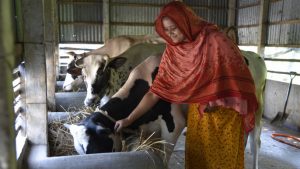He says while the pandemic remains a high priority for farmers, he says those in areas which have been badly affected by adverse weather events are preoccupied with making sure their animals are fed properly and that cull cows are being shipped off to the works in a timely fashion.
“For some of them, the drought is bigger than COVID,” he told Dairy News.
“There is not a lot of supplementary feed around and for a number of weeks we have been encouraging dairy farmers to take action now and think about next season by doing such things as building the covers up and getting fertiliser on to get grass growing while soil temperatures are still warm.
“The other option is to dry cows off early to save feed and be in a good position for next season,” he says.
Mackle says the main areas affected by drought are Northland, the eastern seaboard and top of the South Island. Southland was affected by severe flooding earlier this year.
“They had a wonderful winter then a tough spring and summer with heavy rain and flooding. So they haven’t had a good growing season either but for different reasons,” he says.
He says delays with the killing of cull cows, made worse by COVID-19, has added to the woes of farmers in Southland.
One bit of good news, says Mackle, is that they have been told that supplies of PKE will be available. He says there had been some nervousness in the farming community that this may not be available.
He says overall farmers have been coping very well under the strict COVID-19 regime.
“Partly it is because they are used to a degree of self-isolation already and the nature of most farm work means that physical distancing is not the issue it is in say a meat processing plant,” he says.
He says by and large farmers are just getting on with the business of farming, but some are worried about farm labour and in particular whether they will be able to get migrant workers back on the farm.
Broadband critical
The COVID-19 pandemic has shown just how crucial good broadband is to people throughout the world, says Tim Mackle.
His comments come following the news that the Government is allocating up to $15 million to improve rural broadband, including upgrading some existing rural mobile towers and installing external antennae on households to improve coverage in remote rural areas.
Mackle says food production is going to be so much more important over the next five to ten years for NZ.
“It’s really a no brainer to make sure they have the tools they need in rural communities and of course good broadband is one of the most important things that must be provided,” he says.
Mackle says every year the dairy industry needs about 5,000 new people to come and work on farmers to replace those who leave. He says unless there is good broadband some people are going to think twice about locating their families to areas where broadband is poor.
“Broadband like house and health are key elements of infrastructure that need to be provided if we are to attract people to work in our industry,” he says.













